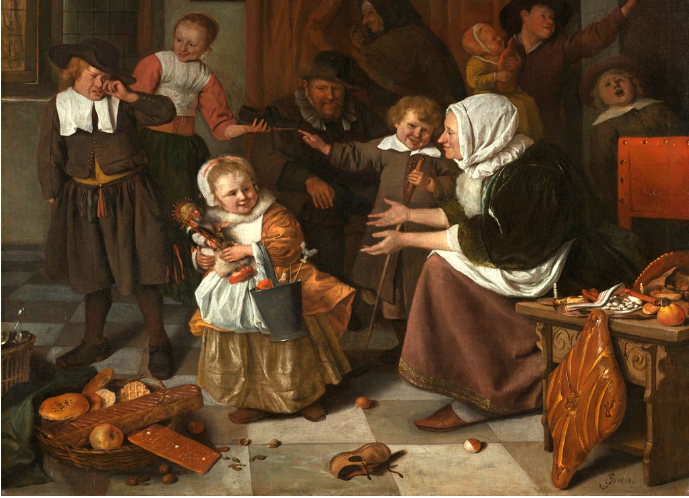I. Demography
The indigenous population of the Netherlands is in steep decline. The droves of migrants brought here do not fill the employment offices; rather, they fill the pockets of the gangs and the developers who build government-funded housing developments for the migrants. Gigantic social transfers for migrants are supposed to encourage them not to work and to have many children so that the demographic gap of the Netherlands is filled. Even so, the demographic gap should rather be replaced with working professionals and not with the educationally disadvantaged newcomers from the Third World who only cash in and produce nothing. People who work at ASML, for example, did not come to the Netherlands on rubber dinghies through the Mediterranean to Rotterdam. They are often foreigners, but they have to go through a tough application process and are specifically chosen.
As our editorial colleague and his team once calculated with the help of Cerberus 2.0 software, the Dutch will be a minority in their country by 2070 at the latest. We have illustrated the demographic developments in a short video.
In the beautiful Netherlands of the future, everything will be different. Festivals will be celebrated very differently, for example December 5. Black Peter (Zwarte Piet) will wear the white beard of St. Nicholas and white St. Nicholas will serve him. This is how it should be in the new beautiful world without racism.


St. Nicholas Day (Pakjesavend) has not changed since 1664, when Jan Stehen painted his “Het Sint Nicolaasfeest” (Rijksmuseum, Amsterdam).
II. The Euro
The Dutch are hard-working and will not be able to retire until 67 in a moment. How is this compatible with Italy and France, the countries in the common euro zone, where the retirement age is 62?
Not everyone in the Dutch elites is blind. Former Finance Minister Hans Hoogervorst has long maintained that the euro is no longer sustainable. In an interview with the daily De Telegraaf, the economist said, “If the Netherlands were to join the eurozone now and adopt the single currency, that would be madness (De Telegraaf).”
Hoogervorst did not spare the European Central Bank (ECB), which has been financing the debts of weak eurozone countries for years. “Because of the ECB’s policies in indebted countries like Italy, it was thought that all the brakes could be released.”
Former DNB head Professor Lex Hoogduin is also critical of the single currency:
“The eurozone has ignored almost all the rules agreed in the 1990s and is now taking on the characteristics of a Latin (Southern European or French-Italian) monetary union. Such a Latin monetary union has, among other things, high inflation and low interest rates, and in such an environment a capital-based pension system is unsustainable,” Hoogduin said. “The Netherlands is the only one of the 19 eurozone countries that has such a capital-based pension system. The savings of pensioners in such a capital-based system melt away with high inflation and low interest rates.” Hoogduin agrees with then-VVD chairman Frits Bolkestein, who warned before the turn of the millennium that the Dutch pension system would prove unsustainable in the eurozone (Wynias Week).
III. The eco-terror
It seems that the days of centrally planned economies are a thing of the past in the Eastern Bloc, but when you look at all sorts of limitations, limits, emission fees of the EU, you could say that socialism and Lenin live on in the West. Ecological totalitarianism seems to be taking a heavy toll, especially in the Netherlands.
A year ago, the Netherlands’ central planners decided to limit nitrogen and ammonia emissions by 2030. The goal was to cut emissions by 50 percent by 2030, and by as much as 70 percent in some areas of the country, which would mean reducing agricultural production by a third. How surprised were Mark Rutte’s cronies, the old “liberal” revolutionaries, when farmers took to the streets and the land around the house of the minister responsible for ecoreform was thickly sprinkled with fresh manure. The green revolutionaries intervened in the style of the red guards: at Heerenveen, the protesters were shot at sharply because Rutte’s government was in the pocket of the construction sector and industrial lobby: such a radical plan to reduce nitrogen oxide and ammonia emissions was just a pretext for expropriation or conversion of agricultural land into industrial land or settlements for migrants, which, by the way, would in practice lead to more pollution in general and air pollution in particular.
The farmers, who represent the key sector of the Dutch economy (agricultural exports alone are worth 105 billion euros), got together and formed their own party – BBB. Since March 15 of this year, when the BBB won the election, every prime minister in Europe should think five times before announcing a climate crusade. As one of the 2022 demonstrators said to a reporter from radio station BNR, “Climate freaks have to eat, too.”
But the battle against the freaks from Brussels will not be won so easily. They will continue to do their evil because they believe in their ideology. It is actually their religion.




